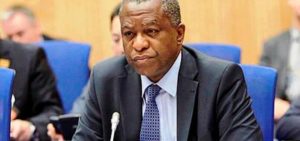 News
News
Insecurity: EU, ECOWAS move to strengthen coordination
The European Union (EU) and the Economic Community of West African States (ECOWAS), has agreed to strengthen coordination in the security of the Sahel and the Gulf of Guinea.This agreement was reached after a closed-door exchanges on the political situation in the West African region between the The European Union (EU) and the Economic Community of West African States (ECOWAS).
Both bodies said it reached the conclusion that West Africa is one of the regions in the continent of Africa where democracy and the respect of human rights is the most advanced.
The EU and ECOWAS also agreed to pursue and maintain common political engagement, most importantly, in supporting free, fair, credible and peaceful elections in the West African region.
The Secretary of State, Finance, Republic of Austria and Chair of the Council of the European Union, Mr Hubert Fuchs, stated this during a press conference by the two regional bodies in Abuja at the end of the 22nd ECOWAS-EU Political Dialogue Meeting.
Fuchs said: “We have agreed that on regional security, there is a need for even greater coordination in the Sahel and to strengthen our common work in the Gulf of Guinea.”
The EU and ECOWAS also took into consideration, the economic life of the West African region and agreed to enhance further partnership.
Fuchs added: “On trade and economy, we agreed on the need to take our partnership even further.”
Fuchs further said since the EU recognised the need for more investments in West Africa, the President of the European Commission, Jean-Claude Juncker, launched in September, the “Africa-Europe Alliance for sustainable investment and jobs.”
According Fuchs, “the West Africa region is particularly fit to benefit from this alliance, as it has resources, including people and talent, dynamism and drive.”
Fuchs further said, “This alliance also lends support to the effective implementation of the Economic Partnership Agreements between the EU and regional grouping in Africa, including ECOWAS.
“Together, they will help lay a firm basis for the African Continental Free Trade Area. The alliance, the Economic Partnership Agreements and the African Continental Free Trade Area will provide opportunities to expand trade, encourage investment, diversify economies, promote industrialisations and create jobs.”
Earlier, Fuchs said the ministerial dialogue exchanged as well, challenge and opportunities over population growth, job creation, migration and mobility.
According to Fuchs, “These are phenomena, which need to be jointly managed, in mutual interest and in a balanced way.”
While saying that the EU is not a fortress, Fuchs added that the EU cannot be borderless either.
Fuchs further said the issue of irregular migration was an issue of high political importance in Europe which it took to ECOWAS in order to find common and constructive and mutually beneficial ways forward.
He said the EU hoped to go about it through solidarity, partnership and shared responsibility.
Also speaking, the Permanent Secretary, Ministry of Foreign Affairs, Mustapha Suleiman, who represented the Chair of the ECOWAS Council of Ministers, said the meeting discussed various areas of cooperation between the EU and the ECOWAS.
Suleiman said, “It has been a fruitful discussion ranging from security to economic cooperation that will enhance both regions. Essentially, areas of concerns have been raised and assurances and commitment have also been given in all those areas.
“We have discussed elections and political situation in some of ECOWAS countries, we have also isolated some challenges and proffer some solutions that both EU and ECOWAS would pursue towards the resolution of political crisis in some of these countries.”
 The Economic Community of West African States’ (ECOWAS) Court of Justice has barred the Federal Government of Nigeria, through the National Broadcasting Commission (NBC) from censorship of political programmes by broadcasting stations across the country.
The Economic Community of West African States’ (ECOWAS) Court of Justice has barred the Federal Government of Nigeria, through the National Broadcasting Commission (NBC) from censorship of political programmes by broadcasting stations across the country. The Minister of Foreign Affairs, Geoffrey Onyeama,has assured the Economic Community of West African States (ECOWAS) and the United Nations election monitoring team of credible elections in 2019 during the 41st Ordinary Session of the ECOWAS Mediation and Security Council which held in Abuja on Thursday,the 13th November.
The Minister of Foreign Affairs, Geoffrey Onyeama,has assured the Economic Community of West African States (ECOWAS) and the United Nations election monitoring team of credible elections in 2019 during the 41st Ordinary Session of the ECOWAS Mediation and Security Council which held in Abuja on Thursday,the 13th November.